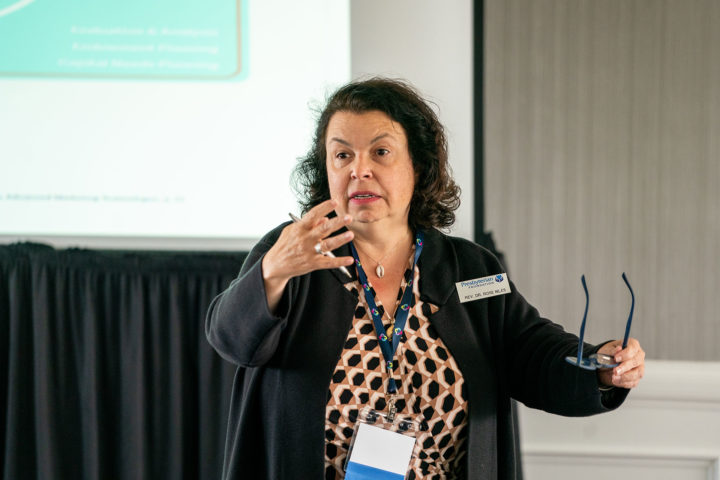10/19/2022
Concentrate on mission to fund ministry
by Rev. Jody Mask

The view from the 15th-floor hotel conference room of Savannah’s Historic Landmark District was impressive. Tall church steeples reaching to the sky testified to the generosity of congregations over the centuries. But in a contemporary church world where dedication to Christian faith is flagging, what can pastors and ministry leaders do to revive the spirit of giving?
Such was the focus of a workshop led by Rev. Dr. Rose Niles, one of the Presbyterian Foundation’s Ministry Relations Officers. Her workshop, “The Word Shall Not Come Back Void: Preaching Stewardship Year-Round,” was based on Isaiah 55:11. “So shall my word be that goeth forth out of my mouth: it shall not return unto me void, but it shall accomplish that which I please, and it shall prosper in the thing whereto I sent it.”
Niles was a speaker at Stewardship Kaleidoscope, an annual conference on giving and generosity, held as a joint effort by the Presbyterian Church (U.S.A.) and the Evangelical Lutheran Church in America.
It’s about mission
As a caution, Niles shared that her own story of faith included a lesson this verse taught her: it is God’s Word that goes out, not hers.
In keeping with this theme of God’s mission and Word, Niles said “I’m not going to talk about the scripture passages you need to preach on to bring about year-round stewardship. I’m going to talk about mission.”
Central to the idea of promoting stewardship from the pulpit beyond the one-month annual campaign is a congregational awareness of its mission. When this happens, committee structures change, attitudes about church finances improve, and people are eager to share stories of how God’s mission of mercy and grace lead to personal outpouring of generosity.
Practically, this means that churches should include mission statements in all of its communications–even if that means reciting it before the benediction in worship.
Niles shared feedback from asking pastors to write down some of their concerns about preaching and teaching about stewardship. Responses included:
- To have confidence to speak about a topic no one likes to talk about; I don’t want to trigger suspicion or guilt in the people.
- How do I connect stewardship to the daily struggles and hopes of my community (some poor, some middle class, many in debt and trying to make it or advance economically)
- How has our church/ministry proved itself worthy of this ask?
Then she asked the attendees to add some “missing items” into the list of concerns:
- The disconnect between the way we use money and spiritual purposes;
- Well-funded mission but struggling operations;
- The seeming self-interest, especially of preachers and pastors.
Culture of generosity
To make the leap from an annual to a perennial focus on giving, churches must develop a “culture of generosity.” This will take time and intention, of course.
Indeed, one step is to add a “fourth T” to the Time/Talent/Treasure model of stewardship: testimony. Asking folks to share the impact that their giving of time, talent and treasure has had on their spiritual well-being, helps churches till the soil of generosity in their congregants. And testifying or story-sharing reminds everyone of the relationship-centered ministry of Jesus. Telling stories of how you either felt better for having given or been the gracious recipient of another’s giving inspires people to focus on their church’s mission, whatever it may be.
Niles contrasted what she called “stagnate” with “visionary” church preaching on giving. Instead of aiming simply for a balanced budget, focus on changing lives. Instead of guilt, focus on the needs of the world. Note how giving is not simply a means to an end of balancing the financial books, but how givers are changed by giving. And in worship, offering should be lifted up as a joyful response to the Word, not as a “time-out.”
To be sure, some of these changes call for a collective leap of faith. Drawing from Joan Gray’s wisdom in the book Sailboat Church, congregations must “row less and sail more.” In other words, trust the wind of the Holy Spirit to send them where they need to go. It’s shifting a church’s collective attitude from scarcity to abundance.
Narrative budgets
As sailors keep logs, then, one tool Niles recommends is a “generosity autobiography” for individuals. For churches, shifting to a narrative budget accomplishes a similar task: to literally tell the story of how giving has changed the lives of givers and recipients alike.
Though she said she would not focus on scriptures as much as mission, Niles did mention Philippians 4:8 (“…whatever is noble, whatever is right, whatever is pure, whatever is lovely, whatever is admirable—if anything is excellent or praiseworthy—think about such things”) as a reminder of the power of constant storytelling. Money well spent is good news, too!
Niles closed with the reminder that preaching about stewardship year-round is not just the preacher’s responsibility, but that of the whole church. While spiritual leaders may coordinate who testifies and when, what is important is cultivating the habit of sharing the good news of giving.
She reminded those gathered of the many tools the Foundation offers to help leaders make this shift in their churches, including the Narrative Budget Creator on stewardshipnavigator.com; personal consultations with churches by Ministry Relations Officers; seminars, workshops and webinars; access to Church Financial Leadership Academy (access code PCUSA)online; and the Stewardship Kaleidoscope conference itself, which proved to be a valuable resource for hundreds of church leaders in 2022.
